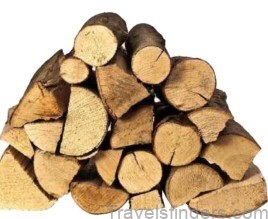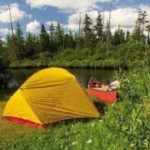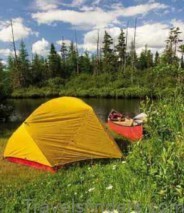Be A nature girl
Want to boost your health and happiness holiday? It’s time to put down that smartphone and reconnect with the elements, say scientists.Here arethe latest ways to have a go…
After a long day at my desk,few thing suncurlmy spine and lift my mood quite like a walkon the nearby heath. As I stroll across thegrass and weave my way between the trees,I’m never alone for long – people of all agesare running, walking, playing or relaxing onthis precious stretch of green. It’s no surprise– I live in London, where the naturalenvironment is at a premium.Around 54 per cent of Brits live in urbanareas, and that number is set to rise to 66 percent by 2030. In 1990, there were only 10mega-cities in the country, but within the next15 years, there’ll be 41. But it’s not just theproliferation of concrete jungles that makegetting back to nature important. We’respending more and more time in front ofscreens (more than 40 hours a week for citydwellers), increasingly depriving ourselves ofcontact with the natural world. According toresearch commissioned by outdoor holidaycompany Sawday’s Canopy & Stars, only threeper cent of people think they spend enoughtime in nature, despite nearly all respondentssaying it makes them feel happier.Spending time in nature isn’t just a goodopportunity for a screen break; it can alsoimprove your health in a myriad of ways.‘If you’re feeling anxious, stressed ordepressed, spending time outdoors and innature can help you to feel significantlybetter,’ says chartered clinical psychologistDr Kate Joseph (katejosephtherapy.com)
Be A nature on Travel Photo Gallery

.A large study from the University of Michiganin the US, and Edge Hill University in the UK,also found walking in nature considerablycombats stress and depression.Thanks to a growing awareness thatspending time in the great outdoors is goodfor us, both mentally and physically, a trendfor reconnecting with nature is emerging. InJapan, home to the concept of ‘forest bathing’,a quarter of the population participates inmindful woodland walking. Closer to home,the Welsh Forestry Commission is runninga programme called Actif Woods, allowingdoctors to prescribe woodland walks tocounteract health issues such as heart problems and depression. But you don’t have to be ill to enjoy the multiple benefits of forests – check out our ideas below. And we predict there’ll be even more opportunities to reconnect with nature emerging this year – watch this green space!
Go wild camping
The point of camping is to enjoy the great outdoors andsleep outside, surrounded by nature. Yet traditionalcampsites can seem the very antithesis of this whenthey’re crowded with tents and noise. Wild camping iscamping in its purest form – you, your tent and thewilderness. Just how wild you go is your choice. First-timers might prefer to flirt with the wild side by picking aquiet campsite with a few pitches across several acres,while experienced wild campers may enjoy hikingfor hours to find a remote spot miles from civilisation.‘There’s no better way to immerse myself in nature thanby spending a night under the stars, far from shops,houses and even farms,’ says regular wild camper GemmaCain. ‘Walking to find the perfect place, pitching my tentas the sun sets and snuggling into my sleeping baglistening to the nocturnal wildlife is magical.’

GIVE IT A GO: Wild camping is not legally permitted inEngland or Wales but is tolerated in some areas, such asparts of Snowdonia and the Lake District, and is allowedunder certain conditions in Dartmoor National Park. Ifyou’re keen to find a secluded spot, join Nearly WildCamping (nearlywildcamping.org) and gain access to anonline directory of 37 locations across the UK, each rankedaccording to facilities and remoteness. For wild campingfurther afield, check pitchup.com, which features places towild camp in France and Spain. You’ll need a tent, sleepingbag and a trowel. And remember, arrive late, leave earlyand leave no trace, so take your rubbish with you.
Try forest bathing
The term forest bathing is a translationof the Japanese ‘shinrin-yoku’, whichmeans ‘taking in the forest atmosphere’.Essentially, it’s a way to deeply connect tonature. The idea is to quietly wander andexplore the natural environment with yourmind focused on – and your senses opento – every sound, scent, colour andsensation of the forest.Increasingly popular (a quarter of Japan’spopulation participates in forest bathing), itwas first named in 1982 by the Japanesegovernment, which has spent $4 millionresearching its benefits. Forest bathingmight sound a bit new age, but researchshows that the experience can reduceblood pressure by 1.4 per cent, heart rateby 5.8 per cent and cortisol levels by12.4 per cent, compared to walking in thecity. One study even indicated exposure tophytoncides (airborne substances releasedby trees to protect them from insects androtting) can boost your immune systemby increasing natural killer cells andanti-cancer proteins by 40 per cent.Forest bathing is now firmly establishedas a pillar of preventative medicine in Japanand is fast becoming popular in SouthKorea, Taiwan and Finland. Forest bathingis also catching on here, with several UKspas and retreats offering treatmentsand packages designed to harness thetherapeutic power of Mother Nature. Oneof the first to be launched is at ArmathwaiteHall (armathwaite-hall.com), a countryhouse hotel in the Lake District, whichmasterfully combines a guided walk in thewoods with breath work and yoga practice.

GIVE IT A GO: Since forest bathing is ablend of mindfulness and walking in nature,it’s fairly accessible for everyone. Spend abit of time choosing a location that appealsto you visually, and when you set off, takeyour time, breathe deeply and bring yourattention to whatever you can see, feel,hear, smell and touch.Dr Kate Joseph believes it’s easier topractise mindfulness outdoors. ‘As it canbe hard to meditate while sitting downand feeling stressed out, some peoplefind mindful walking an easier way topractise mindfulness,’ she says.Our tips? If you go out alone, putyour phone on silent in your bag soyou don’t get distracted, and if you goin a group, agree to stay silent until theend of your ramble so you get the mostout of the experience.
Do a digital detox
It takes a lot of willpower to go cold turkeyfrom your digital devices. Which is whydigital detox retreats are a great idea asthey allow you to switch off – technologyincluded – for a few precious days and offera distraction, often in the form of yoga,meditation and outdoor activities. Theseretreats are springing up all over the UK.

GIVE IT A GO: Digital detox in styleat Chewton Glen in the New Forest. Itsthree-day retreat is an indulgent way tobreak your dependence on technologyand includes guided meditation, yoga andNordic walking through the surroundingHampshire forest. Staying in a treehouse,35ft above the ground, is guaranteed tohelp you reconnect with nature. The bestpart? Enjoying the views from your ownoutdoor hot tub on the terrace deck aftera pampering facial. You’ll be so blissed out,you’ll forget you own a phone! Two-nightdigital detox retreat, full board, from£1,708; chewtonglen.comAlternatively, head to Wales for a weekendof device-free bliss at Unplugged Weekend(unpluggedweekend.com), where you’llspend two days learning how to gogadget-free. Yoga, meditation, therapeuticart sessions and vegetarian food will takeyour mind off emails, and help you focus oncommunicating with your fellow retreat-goers. Two nights’ luxury accommodation,plus food and activities, costs £450.If you can muster the strength to start adigital fast and want to go it alone, committo it publicly, using technology or anold-fashioned conversation. Letting othersknow you’re planning to give up (or reduce)your digital dependence means you won’tworry about being contacted by them.If going cold turkey sounds too much, godevice-free at certain points in the day (atmeal times or for the first hour of the day),disabling push notifications and putting yourphone on flight mode when you don’t needto be online but want to access your music.Finally, plan things to do when you’d usuallybe on screen. Read a book, go for a walkwith a friend or soak in the bath.


Move of-grid
There are about 25,000 properties and75,000 inhabitants living off-grid in the UK,with no access to mains gas, electricity,water or sewage systems. It’s a tinynumber, but one that could increase ifnew batteries, which make collecting andstoring energy from solar panels and windturbines, become more affordable.When you live off-grid, you’re notconnected to, or don’t rely on, the nationalgrid to supply energy to your home. Heatingmay come from a wood-burning stove whileelectricity may be powered by solar panels, awind turbine in your garden or a hydroelectricsystem near your house. Proponents arguethat to live off-grid is to live in harmony withnature, since you’re more likely to usesustainable and renewable energy sources.GIVE IT A GO: If you want to store power,rather than use it immediately, you’ll needbattery storage, which can make it moreexpensive. It also requires you to calculatehow much power you need and monitoryour usage to maintain a steady supply.Rather than disconnecting from the gridentirely, Nick Rosen, editor of off-grid.net,suggests starting slowly. ‘Take just oneroom off the grid with a solar panel and abattery, or go off-grid one day a week.’Keen to find out more? Read Rosen’s bookHow to Live Off-Grid (Bantam, £8.99). ■


Hug a tree
Getting up close and personal with a treeopens you to the many health and wellbeingbenefits reported from the research into forestbathing. It makes sense, since hugging a treeallows you to touch its bark, smell the sapand listen to its branches and leaves movingin the wind which is, after all, the essence of‘shinrin-yoku’ or forest bathing.GIVE IT A GO: Find a tree and squeeze!If you live in Manchester, Bristol, Edinburgh,Cardiff or London, check out Sawday’sCanopy & Stars Urban Tree Hugging Guides atcanopyandstars.co.uk/hug-a-tree – you’ll finddetails of the most huggable trees in your city.



